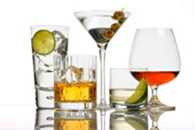 There are many myths and misconceptions associated with the benefits of alcoholic beverages. In fact, doctors and scientists urge not to flatter yourself about the usefulness of alcohol, especially in large quantities. In today's selection, we will debunk Top 10 myths about alcohol.
There are many myths and misconceptions associated with the benefits of alcoholic beverages. In fact, doctors and scientists urge not to flatter yourself about the usefulness of alcohol, especially in large quantities. In today's selection, we will debunk Top 10 myths about alcohol.
By the way, the rate of "fire water" recommended by the World Health Organization is not so small - no more than 2 liters of pure alcohol per year, ie. about a bottle of light wine a week.
10. Vodka - medicine for colds and flu
For many, vodka with pepper is a favorite recipe at the first sign of a cold. However, scientists argue that strong alcohol is not able to improve the functioning of the immune system, and such experiments are completely dangerous for a sore throat. After all, vodka and even with pepper irritates the mucous membrane.
9. Alcohol helps you warm up quickly
Therefore, alcoholic beverages are often called intoxicants. Indeed, 50 grams of cognac or vodka can expand blood vessels and improve blood circulation in the body. But everything above this dose has the opposite effect. Dilated vessels, including those near the surface of the skin, increase heat transfer, and the body loses heat faster.
8. Alcohol is good to drink before meals for appetite
A glass "for appetite" is 25-30 grams of vodka, no more. This amount helps to activate the satiety center in the brain. True, the effect will come only after 20-30 minutes, and few people will wait so long before a meal. And doctors urge not to pour alcohol into an empty stomach, which aggressively affects the mucous membrane.
7. High quality alcohol is harmless
Without exception, all alcoholic beverages have a toxic effect on the body. Of course, low-quality alcohol does much more harm, as it often contains fusel oils, which greatly increase intoxication. It is, of course, necessary to choose good alcohol, but it is still not worth arguing that it is harmless.
6. Alcohol protects against radiation
Scientists have shown that alcohol reduces the barrier function of all tissues in the body, thereby increasing the dose of radiation entering the body. Everyone has heard about the use of red wine to remove radionuclides from the body. However, doctors strongly recommend green tea for these purposes.
5. Beer is less harmful than vodka
Any alcohol-containing drink is harmful to health if consumed in large quantities. Sociologists in many countries argue that beer drinkers end up consuming even more ethyl alcohol than those who prefer spirits. This is explained by the affordability of the "foamy drink" in comparison with vodka, cognac and whiskey.
4. Alcohol is not high in calories
This common myth is often repeated by fans of all kinds of diets. Meanwhile, the energy value of 100 grams of vodka is more than 200 Kcal. Moreover, it is difficult for the body to burn these calories, since they are introduced only through alcohol. Getting rid of wine calories is easier, because the calorie content of this drink is partly due to the presence of carbohydrates.
3.Alcohol relieves stress
Very often in stressful situations, we resort to the help of alcohol to relax and relieve tension. Doctors say that 20-30 ml of vodka or 50 ml of wine have a therapeutic effect. Large doses can either exacerbate feelings of fatigue and depression, or lead to a state of artificial euphoria, followed by deep depression along with a hangover.
2. Alcohol lowers blood pressure
This myth is caused by an incorrect interpretation of the vasodilating effect of alcohol. Indeed, alcohol lowers the tone of the vascular wall, but this does not help to reduce blood pressure. Indeed, at the same time, the heartbeat increases and the blood is more actively pushed into the bloodstream, which increases the pressure. Therefore, alcohol is categorically contraindicated for hypertensive patients.
1. Alcohol increases performance
Many people think that after a glass the work gets done. However, Australian scientists have disproved this myth in practice. According to the results of a large-scale study, it has been proven that even small doses of alcohol dull the reaction rate and reduce the ability to concentrate. As a result, the likelihood of errors and even injury in the process of work increases.
